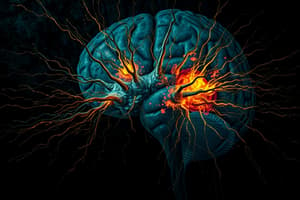Podcast
Questions and Answers
Match the anxiety-related trigger with its description:
Match the anxiety-related trigger with its description:
Stressful events = Examinations, public speaking engagements, job interviews, or relationship conflicts Social situations = Involving large crowds or new environments Feelings of being overwhelmed = Or out of control Changes in daily routines = As a trigger
Match the recommended practice with its benefit for managing anxiety:
Match the recommended practice with its benefit for managing anxiety:
Incorporating relaxation techniques = Maintaining good mental health Regular exercise = Reducing the risk of seizure occurrence Therapy = Addressing underlying sources of stress Self-care practices = Implementing proactive measures
Match the impact on seizure occurrence with the action taken:
Match the impact on seizure occurrence with the action taken:
Addressing underlying sources of stress = Reducing the risk of seizure occurrence Implementing proactive measures = Taking charge of overall wellbeing Consulting with healthcare team = Discussing suitable treatment options Seeking proper guidance and support = Leading a fulfilling lifestyle
Match the type of circumstances with their contribution to anxiety-induced seizures:
Match the type of circumstances with their contribution to anxiety-induced seizures:
Match the importance of self-management skills with its impact on mental health:
Match the importance of self-management skills with its impact on mental health:
Flashcards are hidden until you start studying
Study Notes
Understanding Seizure Triggers: Anxiety's Influence
Seizures occur when there is abnormal electrical activity within your brain. While they can arise from various causes, it's essential to identify potential triggers—factors that may precipitate seizures—to better manage them and improve quality of life. One such trigger we will explore here is anxiety, which plays a significant role in some individuals experiencing epilepsy.
Anxiety is a psychological condition characterized by feelings of unease, apprehension, fear, or worry. It exists along a spectrum, with its effects ranging widely among people, from mild discomfort to debilitating distress. Research has shown that anxiety can exacerbate previously well-controlled epileptic conditions, potentially pushing them into crisis.
There are several ways anxiety may contribute to seizures. Firstly, anxiety itself produces neurochemical changes, increasing stress hormones like cortisol, norepinephrine, and glutamate—all of which promote neuronal excitability. Secondly, anxiety often leads to avoidance behaviors that limit social interaction; this isolation can increase feelings of depression and further complicate mental health issues. Lastly, coping strategies used during periods of high anxiety might involve activities or habits that indirectly spark seizures, known collectively as kindling.
However, it must also be noted that anxiety does not directly cause all seizures in those diagnosed with epilepsy. Nonetheless, managing anxiety effectively remains crucial for preventing seizures induced by emotional states—a phenomenon called emotional-induced seizures. Some common anxiety-related triggers for these types of seizures include:
- Stressful events, such as examinations, public speaking engagements, job interviews, or relationship conflicts
- Social situations involving large crowds or new environments
- Feelings of being overwhelmed or out of control
- Changes in daily routines
- Unpredictable circumstances
Incorporating relaxation techniques, regular exercise, therapy, medication, and self-care practices into one's routine helps maintain good mental health and reduce the risk of seizure occurrence triggered by anxiety. By addressing underlying sources of stress and implementing proactive measures, you can take charge of your overall wellbeing while living with epilepsy.
It is essential to consult with your healthcare team if you suspect that anxiety may be contributing to your seizures. Together, you can discuss suitable treatment options tailored to your unique situation. With the proper guidance, support, and self-management skills, you can lead a fulfilling and healthy lifestyle alongside your diagnosis.
Studying That Suits You
Use AI to generate personalized quizzes and flashcards to suit your learning preferences.




